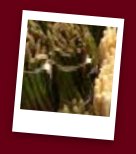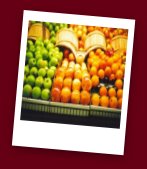|
Washing Produce Safely
What should be washed? Any produce item that sits on a table or cooler at the grocery store and that does not have a bag or plastic wrap on it should be washed. Bagged salads and items that are already cut, like carrot and celery sticks, will already have been washed. The basic rule of thumb is that it if has a sticker on it (the grocery store UPC code), it should be washed. The other rule of thumb – since you have two thumbs – is that if there’s a chance that someone else touched it with bare hands before you bought it, wash it. Even if you’re going to cook it, wash it. Produce isn’t always cooked at high enough temperatures to get rid of the germs, so always wash. To learn more about cooking standards, please click here. How should I wash it?
Produce like peppers, apples and potatoes, which have edible rinds, should be scrubbed with a brush or hands as well, but be sure to get any dirt that might be caked on, especially with potatoes and yams. Lettuces, celery, and other leafy or stalk produce should be separated and then washed, because dirt and germs may be inside the folds and root ends. The best practice is to wash them completely and safely by separating them first, and then washing with the hands or vegetable brush. What about vegetable washes? Studies vary, but there is evidence that vegetable washes do work better than plain water. However, don’t rush out to buy them; the good old standby of cold or lukewarm water, combined with a good rubbing or brushing with a vegetable brush (rather than just letting water run over the produce), can remove germs, soil, wax, and pesticides. We've linked to a great news story about washing produce here.
When should I wash it?
The other option is to wash your produce as soon as you need it, as you’re getting ready to prepare or cook it. This works well, too, but only if you DO it! To learn more about food safety history, click here. There are several Red Flags to look out for in grocery stores and restaurants – do you know what they are? To check out Food-Safety-and-You.com's home page, click here.
|





 We have seen recent recalls and outbreaks of people getting sick from spinach, green onions, and other produce. (
We have seen recent recalls and outbreaks of people getting sick from spinach, green onions, and other produce. ( It depends on what IT is. Hard-rind fruit – like lemons, limes, or melons – are pretty simple to do: place them in cold running water and rub with a brush or your hands.
It depends on what IT is. Hard-rind fruit – like lemons, limes, or melons – are pretty simple to do: place them in cold running water and rub with a brush or your hands.  There are two schools of thought on the matter and it depends on you. One is to wash your produce as soon as you bring the food home. This lets you put it into the fridge clean, but it can cause faster spoilage to some food like strawberries (and other berries), lettuces, and mushrooms. Edible-rind fruits like apples and pears, as well as hard-rind fruits like oranges, may be fine when you clean them this way.
There are two schools of thought on the matter and it depends on you. One is to wash your produce as soon as you bring the food home. This lets you put it into the fridge clean, but it can cause faster spoilage to some food like strawberries (and other berries), lettuces, and mushrooms. Edible-rind fruits like apples and pears, as well as hard-rind fruits like oranges, may be fine when you clean them this way. 